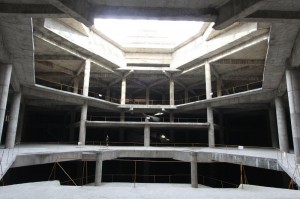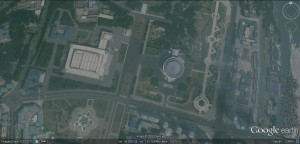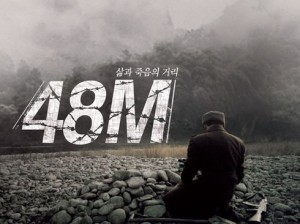Pictured Above (Google Earth): The Mansudae Assembly Hall, meeting place of the Supreme People’s Assembly. To the east of the Hall is the new Peoples’ Theater and new housing apartments along Changjon and Mansudae Streets.
A rare “second session” of the DPRK’s Supreme People’s Assembly was held on September 25th. The unicameral legislature, with little de facto authority, usually holds a single meeting in April of each year. The last special “second session” was held in June 2010 (see below for more information).
This 6th session of the SPA was widely anticipated outside the DPRK because many analysts believed the country would be announcing a plethora of economic adjustment measures. See here for background. None of this was discussed publicly.
Sixth Session of 12th SPA Held
Pyongyang, September 25 (KCNA) — The Sixth Session of the 12th Supreme People’s Assembly of the DPRK was held at the Mansudae Assembly Hall Tuesday.
Kim Jong Un, first secretary of the Workers’ Party of Korea, first chairman of the DPRK National Defence Commission and supreme commander of the Korean People’s Army, was present at the session.
Deputies to the SPA were present there.
Officials of party, armed forces and power bodies, public organizations, ministries and national institutions and those in the fields of science, education, literature and arts, public health and press were present as observers.
The session decided on agenda items of the session.
On Enforcing Universal 12-Year Compulsory Education
Organizational Issue
Deputy Choe Thae Bok made a report “On Enforcing Universal 12-Year Compulsory Education.”
He said that the DPRK government will enforce the universal 12-year compulsory education to drastically improve and strengthen the secondary general education and further consolidate the socialist education system to meet the requirements of the developing revolution and the times.
The new educational system is aimed at helping the younger generation round off the secondary general education by teaching them general basic knowledge and basic knowledge of modern technologies in the period of the 12-year systematic education which consists of one-year pre-school education, five-year primary school education, three-year junior middle school education and three-year senior middle school education, reporter noted.
He referred to the issues arising in successfully enforcing the new education.
Then followed speeches.
The speakers said that the enforcement of the universal 12-year compulsory education at this significant period when the new century of Kim Il Sung and Kim Jong Il’s Korea started is the firm determination and will of the WPK to steadfastly carry forward and glorify the idea and cause of Generalissimos Kim Il Sung and Kim Jong Il who devoted their all to the future of the country all their life.
The enforcement of the new education provided a sure guarantee for putting secondary general education onto a higher stage and effecting an epochal turn in the work to train able revolutionaries in keeping with the requirements for the building of a thriving nation, they noted.
Ordinance of the SPA of the DPRK “On Enforcing the Universal 12-Year Compulsory Education” was adopted at the session.
The session discussed organizational issue.
Hong In Bom, chief secretary of the South Phyongan Provincial Committee of the WPK, and Jon Yong Nam, chairman of the Central Committee of the Kim Il Sung Socialist Youth League, were elected members of the SPA Presidium to fill the vacancies.
Choe Hui Jong was recalled from the post of chairman of the Budget Committee of the SPA and Kwak Pom Gi elected chairman of the budget committee.
Issues Concerning Enforcement of Universal 12-year Compulsory Education Discussed at SPA Session
Pyongyang, September 25 (KCNA) — Deputy Choe Thae Bok made a report on enforcing the universal 12-year compulsory education at the sixth session of the 12th Supreme People’s Assembly of the DPRK held on Tuesday.
According to the report, the DPRK government will enforce the universal 12-year compulsory education to drastically improve and strengthen the secondary general education and further consolidate the socialist education system to meet the requirements of the developing revolution and the times.
The universal 12-year compulsory education represents the development of the universal 11-year compulsory education that has been enforced by the DPRK government, and a new higher stage of the secondary general education.
The new education system is aimed at helping the younger generation round off the secondary general education by teaching them general basic knowledge and basic knowledge of modern technologies in the period of the 12-year systematic education which consists of one-year pre-school education, five-year primary school education, three-year junior middle school education and three-year senior middle school education.
The reporter said that the enforcement of the universal 12-year compulsory education is a huge task to be carried out as a nationwide movement with the involvement of whole society. He elaborated on it.
The order and phases for the enforcement of the system shall be fixed properly and be thoroughly carried out, he said.
An important task for enforcing the universal 12-year compulsory education is to properly shape the educational contents and improve the methods of education, he added.
He called for stepping up the work for improving the curricula which constitute a basis in arranging the educational contents, and confirming the general goal of the secondary general education, goals of the courses of study and the scope and level of educational contents. He also underscored the need to write and publish necessary textbooks at an early date.
He also underlined the need to strengthen education in computer technology and foreign languages with a main emphasis on the education in general basic knowledge in the field of basic sciences including mathematics, physics, chemistry and biology.
He also called for kicking off an intensive drive for creating new and substantial educational methods and generalizing them as well as actively introducing test methods for correctly assessing the abilities of students.
All the schools should carry out the positive drive to put the teaching, experiments and practical training on an IT basis, computerize the educational administration and management and establish information communications network between the education committee and educational institutions across the country so that teachers and students can receive information necessary for the education in time, the reporter noted.
He also called for successfully building up in a substantial way the ranks of teachers who are directly responsible for education and drastically raising their levels and roles.
Increased state investment in the educational field and provision of educational conditions are a sure guarantee for the successful enforcement of the universal 12-year compulsory education, he said, and continued:
The expenditure for education should be markedly increased in the state budget, and electricity, equipment and materials needed for education be provided on a preferential basis.
The role of organizations patronizing schools should be raised and the officials of all units including provincial, city and county people’s committees should pay deep attention to the education and push forward the work for the enforcement of the universal 12-year compulsory education in close combination with the model education county movement.
Educational and scientific research institutions should strengthen study for raising the quality of the universal 12-year compulsory education on the basis of a correct review and analysis of the present state of education of the country and the worldwide education trend. They should analyze and systematize scientifically and theoretically the new and advanced teaching methods and experience created in practice and generalize them.
The reporter stressed the need to step up the work for successfully enforcing the universal 12-year compulsory education true to the noble intention of the dear respected Kim Jong Un manifested in his ardent love for the younger generation and the future.
Ordinance of DPRK SPA on Enforcing Universal 12-Year Compulsory Education Promulgated
Pyongyang, September 25 (KCNA) — Ordinance of the DPRK Supreme People’s Assembly on enforcing universal 12-year compulsory education was promulgated at the sixth session of the 12th SPA held in Pyongyang Tuesday.
According to the ordinance, the DPRK government enforced the compulsory primary education in 1956, compulsory secondary education in 1958 and Korean-style unique universal 9-year compulsory technical education which closely combined secondary general education with basic technical education and education with production in 1967.
In 1972 the DPRK government introduced the universal 11-year compulsory education, the first of its kind in the world.
The enforcement of the universal 11-year education was a just measure for raising the level of free compulsory education, improving the contents of education and bringing up the new generations to be able revolutionaries and competent socialist builders intensely loyal to the party, the leader, the country and its people as required by the era and the developing revolution.
The DPRK is now demonstrating its might as a dignified military power possessed of nuclear deterrent, a country that manufactures and launches satellites. Korean-style CNC technology and flexible production system have been introduced to the different domains of the national economy and a great number of Juche-based and modern heavy and light industrial bases and grand monuments have been built. This is associated with the feats and merits of young scientists and youth who have grown up, receiving the universal 11-year compulsory education.
The Workers’ Party of Korea and the DPRK government are set to enforce the universal 12-year compulsory education reflecting the present requirements for building a prosperous socialist country in all fields now that the requirements for education have risen higher than ever before.
The enforcement of the universal 12-year compulsory education is a step reflecting the dear respected Kim Jong Un’s noble outlooks on the country, the younger generation and future and it is a great event that demonstrates before the whole world that the DPRK is dynamically advancing toward an educational power and a highly civilized socialist country.
The universal 12-year compulsory education is the most just and advantageous education for drastically raising the quality of education to meet the requirements for the development of education in the age of knowledge-based economy and the trend of the world and bringing up the younger generation to be Juche-type able revolutionaries possessed of ample secondary general knowledge, modern basic technology and creative ability.
The SPA of the DPRK discussed the issue of enforcing the universal 12-year compulsory education and made a decision.
According to the decision, the universal 12-year compulsory education shall be enforced in all areas of the DPRK.
The universal 12-year compulsory education shall be enforced free of charge and all children from 5 to 17 years are obliged to receive this education.
This education consists of one-year pre-school education and five-year primary schooling, three-year junior middle schooling and three-year senior middle schooling.
The six-year middle schooling shall be enforced from the 2013-2014 school year, divided into three-year junior middle schooling and three-year senior middle schooling.
The work for converting the four-year primary schooling to five-year primary schooling shall go through the preparatory phase to be started in the 2014-2015 school year and this shall be finished in 2-3 years.
Educational system and education of special courses of study shall be decided as separate issues.
Measures shall be taken to solve the shortage of teachers resulting from the enforcement of the universal 12-year compulsory education, raise their qualifications and improve educational methods.
State investment in education shall be increased and conditions and environment necessary for the enforcement of the universal 12-year compulsory education be created.
Administrative guidance and legal control shall be strengthened for the successful enforcement of the universal 12-year compulsory education.
5. 1st Session of the 12th Supreme People’s Assembly (regular session: 2009-4): KCNA and here.
6. Elections for the 12th Supreme People’s Assembly were held in March 2009. See here, here, here.




